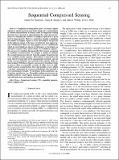| dc.contributor.author | Malioutov, Dmitry M. | |
| dc.contributor.author | Sanghavi, Sujay R. | |
| dc.contributor.author | Willsky, Alan S. | |
| dc.date.accessioned | 2011-03-04T19:17:26Z | |
| dc.date.available | 2011-03-04T19:17:26Z | |
| dc.date.issued | 2010-04 | |
| dc.date.submitted | 2009-10 | |
| dc.identifier.issn | 1932-4553 | |
| dc.identifier.other | INSPEC Accession Number: 11172106 | |
| dc.identifier.uri | http://hdl.handle.net/1721.1/61416 | |
| dc.description.abstract | Compressed sensing allows perfect recovery of sparse signals (or signals sparse in some basis) using only a small number of random measurements. Existing results in compressed sensing literature have focused on characterizing the achievable performance by bounding the number of samples required for a given level of signal sparsity. However, using these bounds to minimize the number of samples requires a priori knowledge of the sparsity of the unknown signal, or the decay structure for near-sparse signals. Furthermore, there are some popular recovery methods for which no such bounds are known. In this paper, we investigate an alternative scenario where observations are available in sequence. For any recovery method, this means that there is now a sequence of candidate reconstructions. We propose a method to estimate the reconstruction error directly from the samples themselves, for every candidate in this sequence. This estimate is universal in the sense that it is based only on the measurement ensemble, and not on the recovery method or any assumed level of sparsity of the unknown signal. With these estimates, one can now stop observations as soon as there is reasonable certainty of either exact or sufficiently accurate reconstruction. They also provide a way to obtain ??run-time?? guarantees for recovery methods that otherwise lack a priori performance bounds. We investigate both continuous (e.g., Gaussian) and discrete (e.g., Bernoulli) random measurement ensembles, both for exactly sparse and general near-sparse signals, and with both noisy and noiseless measurements. | en_US |
| dc.description.sponsorship | United States. Army Research Office (Grant W911NF-05-1-0207) | en_US |
| dc.description.sponsorship | United States. Air Force Office of Scientific Research (Grant FA9550-04-1-0351) | en_US |
| dc.language.iso | en_US | |
| dc.publisher | Institute of Electrical and Electronics Engineers ; IEEE Signal Processing Society | en_US |
| dc.relation.isversionof | http://dx.doi.org/10.1109/jstsp.2009.2038211 | en_US |
| dc.rights | Article is made available in accordance with the publisher's policy and may be subject to US copyright law. Please refer to the publisher's site for terms of use. | en_US |
| dc.source | IEEE | en_US |
| dc.title | Sequential Compressed Sensing | en_US |
| dc.type | Article | en_US |
| dc.identifier.citation | Malioutov, D.M., S.R. Sanghavi, and A.S. Willsky. “Sequential Compressed Sensing.” Selected Topics in Signal Processing, IEEE Journal of 4.2 (2010): 435-444. © 2010, IEEE | en_US |
| dc.contributor.department | Massachusetts Institute of Technology. Department of Electrical Engineering and Computer Science | en_US |
| dc.contributor.approver | Willsky, Alan S. | |
| dc.contributor.mitauthor | Malioutov, Dmitry M. | |
| dc.contributor.mitauthor | Willsky, Alan S. | |
| dc.relation.journal | IEEE journal of selected topics in signal processing | en_US |
| dc.eprint.version | Final published version | en_US |
| dc.type.uri | http://purl.org/eprint/type/JournalArticle | en_US |
| eprint.status | http://purl.org/eprint/status/PeerReviewed | en_US |
| dspace.orderedauthors | Malioutov, D.M.; Sanghavi, S.R.; Willsky, A.S. | en |
| dc.identifier.orcid | https://orcid.org/0000-0003-0149-5888 | |
| mit.license | OPEN_ACCESS_POLICY | en_US |
| mit.metadata.status | Complete | |
